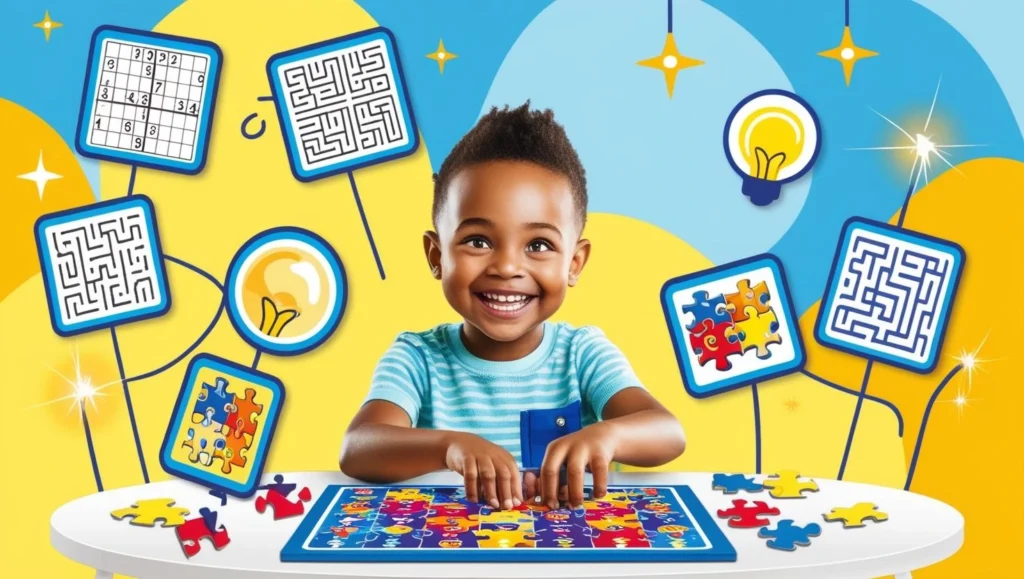Puzzle games are a fantastic way to boost a child’s logical thinking and problem-solving skills. These games not only provide hours of entertainment but also help kids develop critical cognitive abilities that benefit them in academics and daily life. Here’s a detailed look at five engaging puzzle games that foster logical thinking in children.

Table of Contents
1. Sudoku
What is Sudoku?
Sudoku is a logic-based number puzzle that involves filling a grid so that each row, column, and sub-grid contains all the digits from 1 to 9 without repetition. It has simpler versions for beginners, such as 4×4 or 6×6 grids, making it accessible for kids.
How it Works:
- A grid is presented with some numbers pre-filled.
- The player uses logical deduction to figure out the placement of the remaining numbers.
Benefits for Kids:
- Pattern Recognition: Kids learn to spot patterns and use them to make logical decisions.
- Critical Thinking: It teaches children to analyze and rule out possibilities.
- Concentration and Focus: The process demands sustained attention, enhancing concentration.
Getting Started:
Begin with easier grids and increase complexity gradually.
Provide printed puzzles or download beginner Sudoku apps.
2. Jigsaw Puzzles
What are Jigsaw Puzzles?
Jigsaw puzzles consist of pieces that interlock to form a complete picture. They come in various sizes and complexity levels, catering to different age groups.
How it Works:
- A picture is divided into small pieces with unique shapes.
- Players assemble the pieces by matching colors, patterns, and shapes.
Benefits for Kids:
- Spatial Awareness: Helps children understand how different shapes fit together.
- Fine Motor Skills: Manipulating small pieces improves hand-eye coordination.
- Patience and Persistence: Teaches kids the value of perseverance in completing a task.
Getting Started:
Gradually increase the number of pieces as their skills improve.
Start with puzzles that have large, simple pieces for younger children.
3. Tangrams
What are Tangrams?
Tangrams are a type of puzzle consisting of seven geometric shapes (called tans) that can be arranged to form a variety of figures, such as animals, objects, and abstract designs.
How it Works:
- A pattern or silhouette is provided as a guide.
- Players arrange the tans without overlapping to match the given shape.
Benefits for Kids:
- Geometry Skills: Tangrams introduce concepts of shapes, angles, and proportions.
- Creative Problem-Solving: Encourages kids to think outside the box to fit the pieces.
- Visualization Skills: Helps in mentally rotating and arranging shapes.
Getting Started:
Encourage freeform creativity by asking them to design their own figures.
Provide kids with a tangram set and easy patterns to replicate.
4. Maze Games
What are Maze Games?
Mazes are puzzles that require finding a path from a starting point to a goal through a network of pathways, avoiding dead ends.
How it Works:
- A maze is presented on paper or digitally.
- Players trace or navigate a path to reach the endpoint.
Benefits for Kids:
- Strategic Thinking: Develops planning skills as kids map out routes.
- Goal-Oriented Behavior: Teaches perseverance to achieve objectives.
- Motor Skills: Tracing mazes helps refine hand movements in younger kids.
Getting Started:
Gradually introduce more complex mazes with twists, turns, and multiple paths.
Use simple mazes for beginners, with clear paths and minimal obstacles.
5. Logic Grid Puzzles
What are Logic Grid Puzzles?
Logic grid puzzles involve a set of clues and a grid where players deduce relationships between elements, such as matching people to their pets or solving a scheduling mystery.
How it Works:
- Players read clues and use deduction to fill in the grid correctly.
- The goal is to match all items based on the information provided.
Benefits for Kids:
- Critical Thinking: Requires analyzing multiple pieces of information.
- Organizational Skills: Kids learn to arrange data systematically.
- Attention to Detail: Teaches kids to focus on subtle clues and avoid errors.
Getting Started:
- Provide puzzles with 2-3 variables to begin with.
- Look for themed puzzles that match their interests, such as animals or sports.
Conclusion
Puzzle games are more than just a source of entertainment—they are a gateway to critical cognitive development for kids. By incorporating these games into your child’s routine, you can nurture their logical thinking, problem-solving skills, and creativity. Choose one of these puzzle games today and give your child the tools they need to succeed in life!
Read more:-
बच्चों के लिए भगवद्गीता: सरल भाषा में जीवन के अनमोल पाठ
बच्चों के लिए प्रभावी दिनचर्या: स्थिरता और सकारात्मक विकास के लिए एक गाइड


